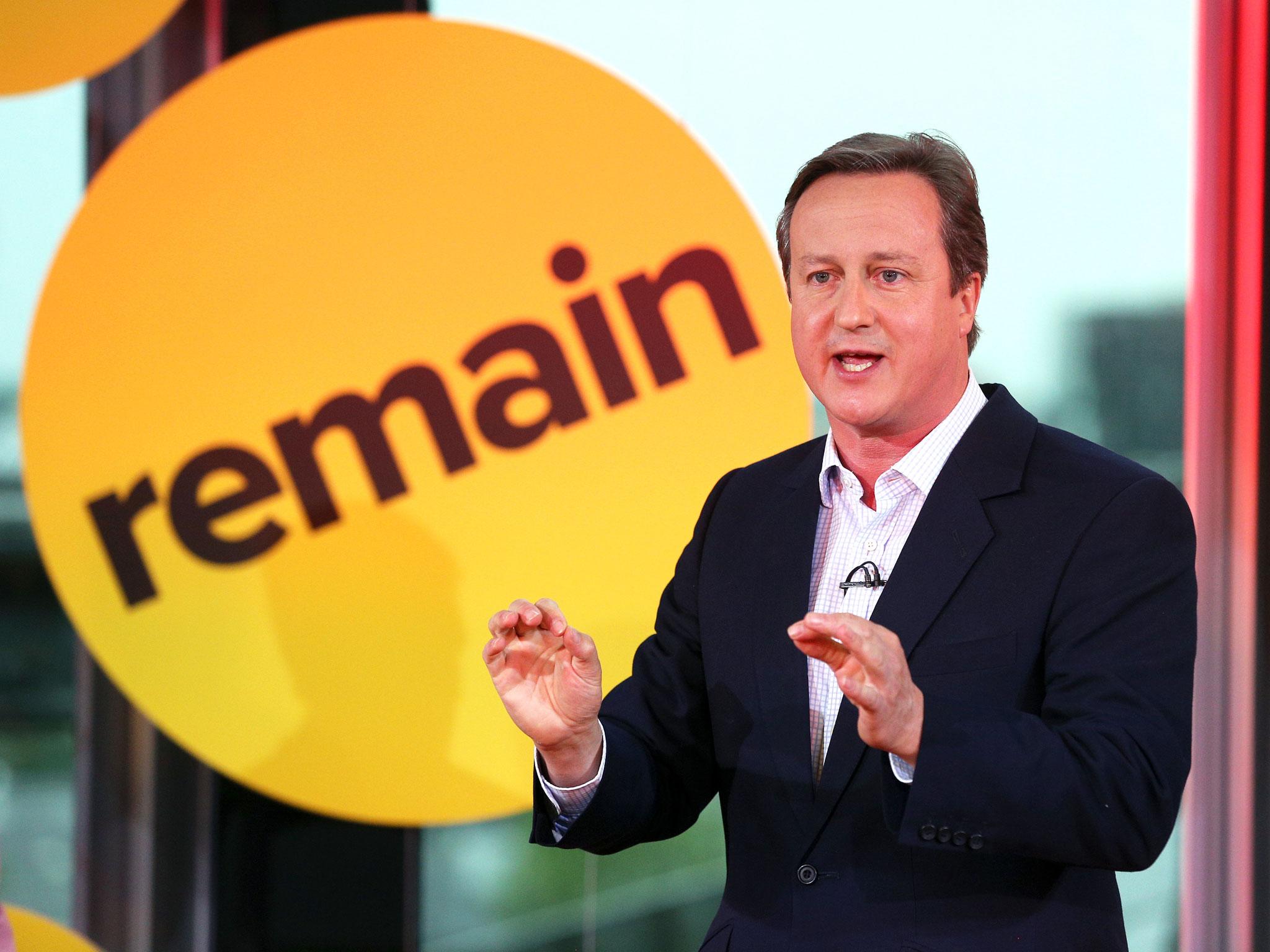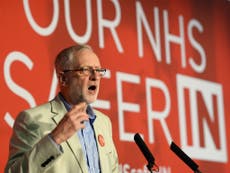David Cameron could be leading a cross-party government within weeks, however we vote in the EU referendum
The political party system is tottering and will soon collapse. But there are ways we can fix our damaged democracy


“The crisis consists precisely in the fact that the old is dying and the new cannot be born.” This comment published 80 years ago by Antonio Gramsci, the early 20th-century Italian Marxist, seems to me to fit exactly the circumstances in which Britain will find itself on Friday, whatever the result of the referendum vote the previous day.
Let us start with the old. The Conservative Party looks as if it is on the way to splitting into two parts. One reason why it would be impossible to go back to business as usual is the strength of the criticism that the leaders of the two sides have directed at each other. Boris Johnson and Michael Gove, for instance, in an open letter to the Prime Minister published on 29 May, wrote that the promise to cut net migration to tens of thousands was “plainly not achievable… and the failure to keep it is corrosive of public trust in politics”.
Then, on 5 June, in a further letter, they ridiculed the Prime Minister’s recent renegotiation of the terms of Britain’s membership of the European Union, saying that it “left us dangerously and permanently exposed to being forced to hand over more money and accept damaging new laws”.
Finally on 16 June, and in a third missive, Johnson and Gove sarcastically asked Cameron if he could confirm whether it is Government policy “not to seek any further reforms of the EU’s free movement laws and regulations?”
Last weekend. the Prime Minister hit back by saying that voters should reject “three total untruths” promoted by Johnson and Gove. “They have said we give the EU £350m every week and that we cannot stop Turkey joining or the formation of an EU army. All three are totally untrue.”
A second aspect of the split in the Conservative Party was the failure of George Osborne’s Budget threat issued on 15 June. Here was no less a figure than the Chancellor of the Exchequer warning that a vote to leave the EU would force him to raise taxes or cut spending by £30bn only to be answered by 57 MPs of his own party who said that they would block any such budget. Which they can do.
In a statement they commented that they found it “incredible that the Chancellor could seriously be threatening to renege on so many manifesto pledges”. This quarrel is too wide ranging to be wished away.
Nor are the Conservatives the only political party in trouble. Since Jeremy Corbyn became leader of the Labour Party, many of its MPs have been openly rebellious. And the Liberal Democrats were virtually destroyed at the 2015 general election.
So here is the checklist: Conservative Party: split; Labour Party: in disarray; Liberal Democrats: severe losses.
That isn’t the end of it. There is another serious development running in parallel: the decline in people’s trust in their political leaders. Which is cause, and which is consequence, it is impossible to say.
What is certain, however, is that the systematic, shameless spinning and fear-mongering of the Remain and Leave campaigns has further reduced the respect in which our aged political system is held.
The truth is that the party system – a part of our everyday lives since Labour formed its first government in 1924 – is tottering and will soon collapse.
During its long history, the Conservative Party has split on a number of occasions and reformed after some years of confusion. Two famous precedents both turned on trade issues – as does this week’s referendum to a large extent.
One was the repeal of the Corn Laws in 1846. These were originally a system of import duties and export bounties designed to ensure that English farmers grew enough grain. But as the population grew in the 19th century, the export bounties were abolished, leaving only import duties that then began to be seen as a device for protecting landowners and penalising consumers.
The split that ensued meant that it would be another 28 years before a Conservative Prime Minister had a majority in the House of Commons.
The Conservative Party split again in 1904 over the issue of tariff reform. Joseph Chamberlain wanted to subvert Britain’s free trade stance by re-introducing tariffs except for the import of products from the Empire, the so-called ‘Imperial preference’.
Winston Churchill was one of the Tory MPs who crossed the floor of the House of Commons in protest to sit on the Liberal benches. The Conservatives went down to a landslide defeat against the Liberal Party in the general election of 1906, ending up with only 157 MPs.
If a lengthy period of political instability is likely to follow the completion of the referendum – whatever the outcome of the vote – the pressing question is going to be how to govern. One solution would be the formation of a ‘national’ government. The only precedent, other than wartime, goes back to the Great Depression of the 1930s.
In August 1931, Ramsay MacDonald’s Labour government found itself unable to agree how to handle the crisis. MacDonald agreed to form a National Government composed of “men from all parties” with the specific aim of balancing the Budget and restoring confidence.
Might Cameron have to do a Ramsay MacDonald? The Prime Minister stated last weekend that he would remain at Downing Street regardless of the result of the EU referendum. He said he was the best person to lead negotiations over Europe even after a Leave vote, on account of his “strong relationships” with other EU countries.
But given the high feelings running in the Conservative Party, he might only be able to do that by forming a national government with senior ‘Blairite’ figures in the Labour Party. After all, Cameron has run a coalition government, so he has the experience.
At best, however, this would be a stopgap. It tells us nothing about the ‘new’ politics that is yet to be born.
I hope myself that the ‘new’ would have three characteristics. First, the political process would be more consultative than it is at present. To this end I would favour a further expansion of the work of the parliamentary select committees. These are the bodies that have recently held Mike Ashley of Sports Direct and Philip Green, the former owner of BHS, to account. They should hold hearings in regional centres as well as in the Palace of Westminster.
Second, MPs should be subject to term limits, which would mean that they could not stand for re-election to the House of Commons more than, say, twice. This would prevent the creation of a political class. Politics would no longer be a lifetime career but a public duty.
And third, citizens who have done something with their lives other than politics should be willing to stand for Parliament knowing that with term limits, it would not be a job for life.




Join our commenting forum
Join thought-provoking conversations, follow other Independent readers and see their replies